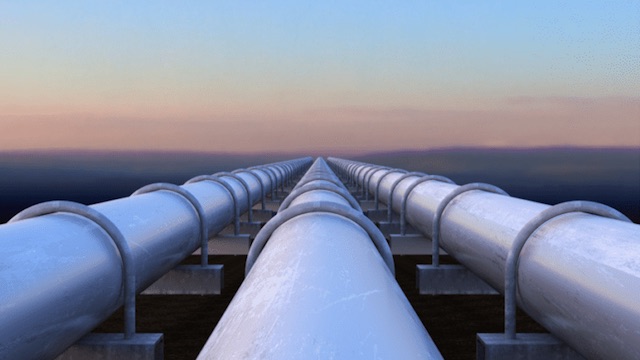Economy
Wrapping Up Canadian Energy 2023 – Prosperity, Power Struggles, Pipelines, EV Promises and “Pie in the Sky” Politics

From EnergyNow Media
By Deidra Garyk
2023 was an optimistic year in the Canadian oil patch. The +15 walkway system in downtown Calgary has been buzzing with the energy of people hurrying to business meetings and networking events.
Some of those scurrying about were headed to talk multi-billion-dollar merger and acquisition (M&A) deals that the patch continued to experience throughout the year. Traditional oil companies also bought alternative energy and carbon tech companies. Carbon capture, utilization and storage (CCUS) was the investment decision of the year.
Oil and gas prices remained relatively high. Not great, but not in the toilet like the dark years of 2015 to 2021. That meant government coffers filled, easing some of the debt burden accumulated during COVID. Oil and gas companies, producers and the many service providers who support the production, were able to continue paying down debt and providing returns to patient shareholders.
Canadian majors Suncor, Cenovus, and Enbridge went through leadership changes at the top. I wish these men success and courage. They are going to need it to embolden pragmatism at all levels of government.
The Canadian federal government continues to be all-in on climate and green energy, seemingly to the exclusion of traditional, reliable energy sources. Although, since climate change has taken a backseat to affordability and energy security for the voting public – the only people politicians really care about – the Liberals have had to rebrand some programs to get buy-in.
One example is renaming the “Just Transition” the Sustainable Jobs Plan. Other than the name, not much has changed. There is still a push for unionized, non-oil and gas jobs.
The feds “invested” (their word, not mine) billions of dollars in EV battery plants, continuing to go all-in on 100 percent EV car sales in twelve years. Senior bureaucrats at Transport Canada even touted the nearness of EV heavy-duty commercial transportation and equipment. (Someone should tell them it will not work well in remote locations with no charging infrastructure.) Energy and Natural Resources Minister Jonathan Wilkinson lauded the day when agricultural equipment goes all electric, fantasizing about the economic boon that will bring. (Someone else should tell him it will not be experienced by farmers who have to spend their hard-earned dollars on equipment replacements.)
Joe Biden visited Ottawa in March. I happened to be there for a conference, so I got to experience the pomp and circumstance first-hand. I have never seen so much security, and I have travelled to places under military control and lived in a country that remains perpetually under the threat of foreign invasion.
Biden’s motorcade is a long, emissions-belching row of vehicles. I did not see any EVs. It includes two “Beasts” (one used as a decoy while the other transports the President), an ambulance, and several tricked-out SUVs. It is quite a spectacle.
As expected, topping the list of topics on the visit’s agenda, President Biden and Prime Minister Trudeau talked about energy and climate, as outlined in their joint statement.
Global sustainability reporting standards were released in June and come into effect January 1, 2024. Publicly traded companies are waiting for Canada to release jurisdiction-specific regulations to understand the magnitude of what will be required. In the Fall Economic Update, released November 22, the feds said rules will be put in place to extend mandatory climate reporting to private companies. That is a big hint at what all companies should expect, at a minimum.
You can listen to my podcast on the subject with energy analyst Dr. Tammy Nemeth here.
On the topic of climate, Bill S-243, An Act to enact the Climate-Aligned Finance Act and to make related amendments to other Acts passed second reading in the Senate in June. You may think this is just some boring Senate bill, but oil and gas boards and employees need to be aware of it.
The bill aims to restrict investment in hydrocarbons, forces companies to set climate commitments, and dictates who has to be part of a company’s board of directors. Worse, section 13(1) Appointment – restriction outlines who cannot be a board member – anyone who works in or owns shares in a fossil fuel company.
It goes as far as to include: “And whereas investment in energy efficiency, clean energy and clean technologies and the incentivization of innovation and behavioural change must replace investments in greenhouse-gas-emission-intensive activities for effective action against climate change.” It targets “fossil fuel activity” in the definition of “emissions-intensive activities”.
Alignment with climate commitments requires that companies:
- take into consideration vulnerable groups, communities and ecosystems, including the biodiversity of those ecosystems,
- make decisions based on equity and the best available science and
- do not promote, foster or exacerbate food insecurity or inequalities in society; and
- do not cause significant harm to social and environmental obligations recognized by Canada.
This bill should trouble any rational person, and it is not getting enough attention. It ramps up climate hysteria and enshrines it into all financial decision making. It is ideological to its core.
I encourage you to read the bill here.
Fortunately, two major, necessary egress projects – Coastal GasLink and Trans Mountain – are well underway before Bill S-243 can stop them. Coastal GasLink reached major milestones of 100 percent pipeline installation and mechanical completion, ahead of schedule. Unfortunately, the federally owned Trans Mountain pipeline has continued to experience delays and a cost increase to $30.9 billion. Although, it was about 80 percent complete in March and expected to be in service in the first quarter of 2024, the project has been delayed due to issues over the route and may not be completed until the end of 2024.
Canada’s summer wildfire season had environmental activists hot and bothered, blaming one thing, and one thing only – climate change!
Calgary hosted the 24th World Petroleum Congress and world energy leaders in September. The torch was passed on to Saudi Arabia to host next. Based on their booth, it will be an extravaganza that will undoubtedly proudly display their oil and gas development. Energy and Natural Resources Minister Jonathan Wilkinson dutifully kept to the Liberal’s script and was challenged to mention the words “oil” and “gas” during his speech at the World Petroleum Congress. This caused the ire of Alberta Premier Danielle Smith, who has had it with the feds’ attitude towards oil and gas.
She has now invoked the Alberta Sovereignty Act in an attempt to prevent the federal government from being able to enact the Clean Electricity Standard by 2035. She has taken a lot of heat for it, but Saskatchewan’s Premier Scott Moe did it first with the colloquially named Saskatchewan First Act. When adversarial Environment and Climate Change Canada Minister Steven Guilbeault threatened to criminalize the use of coal-fired power generation past 2030, Moe puffed out his chest and said, “come get me!”
For all the partisan naysayers attacking the Premiers, I recommend reading Electricity Canada’s response to the Clean Electricity Regulations. It is emotionless and objective, and it sides with the Premiers.
Good thing there is serious discussion about the electricity grid and reliability happening in the Edmonton Legislature because Alberta’s grid operator AESO has issued several warnings in the last year, on both hot and cold days. This has me impatiently waiting for the 2,700 megawatts of new natural gas-powered generation to come on in 2024.
November was all about the carbon tax fight. The feds doubled down on the importance of carbon taxes in the fight against global warming, but not in regions where their sitting MPs risk losing their seats (i.e. their jobs) in the next election. If you think it was not political, you are fooling yourself. They are still fighting over the applicability of a tax on farmers. As someone who eats, I would like it removed to keep the cost of food down.
Premier Moe will not charge Saskatchewan residents carbon tax on natural gas and electricity used to heat homes. This seems reasonable considering that it gets really, really, really cold in Saskatchewan for many days in the winter and reliable energy is a must.
In a hotter region of the world, Dubai, United Arab Emirates hosted COP28 in December. It is the twenty eighth UN climate conference, and yet we appear no closer to solving the thing they say is a crisis – rising emissions. The globe reached the height of emissions in 2023, even though coal use is down and renewable energy capacity and investment is up, up, up, according to the International Energy Agency.
As expected, Canada made various expensive pledges. Minister Guilbeault bounces to the podium for a photo op, drops a climate pledge or two, and the rest of us are left trying to figure out how to meet the commitment. The most contentious for Alberta and Saskatchewan was the oil and gas emissions cap that has been called a de facto production cap.
GEOPOLITICS
With energy security remaining a priority for citizens, nuclear is no longer a bad word. Countries and regions are expanding existing nuclear infrastructure and there is increasing public acceptance for small modular reactors. The false fear tactics used by the anti-nuclear activists have finally been shown for what they are – exaggerated and untrue.
The BRICS alliance expanded with the addition of six new members: Iran, Saudi Arabia, Egypt, Ethiopia, Argentina, and the United Arab Emirates.
Not only are the BRICS nations population and economic power players, they hold the keys to unlocking vast reserves of reliable energy. Total oil production from BRICS nations will be between 40-45 percent of global oil production, more than OPEC’s 35-40 percent. In addition, the members hold vast reserves of the minerals needed for any future energy transformation.
Forty other countries applied to join, demonstrating an interest in the group. Western leaders and NGOs would be wise to pay attention to the growing influence of the BRICS, even if they dislike some of the members.
BRICS is my geopolitical story of the year as it continues to disrupt global energy markets. In 2022, India increased purchases of discounted Russian oil by forty percent. This year, India purchased oil from the United Arab Emirates in rupees, their local currency. These are two examples of the shifts that are happening but are seemingly ignored by the West.
Overall, it appears that pragmatism and realism are influencing political energy decisions, and 2024 is expected to be another positive year for the Canadian oil patch.
All the best for the new year. May you enjoy peace and prosperity.
About Deidra Garyk
Deidra Garyk has been working in the Canadian energy industry for almost 20 years. She is currently the Manager, ESG & Sustainability at an oilfield service company. Prior to that, she worked in roles of varying seniority at exploration and production companies in joint venture contracts where she was responsible for working collaboratively with stakeholders to negotiate access to pipelines, compressors, plants, and batteries.
Outside of her professional commitments, Deidra is an energy advocate and thought leader who researches, writes, and speaks about energy policy and advocacy to promote balanced, honest, fact-based conversations.
Automotive
Canadian interest in electric vehicles falls for second year in a row: survey

From LifeSiteNews
Canadians’ disinterest in electric vehicles comes as the Trudeau government recently mandated that all new light-duty vehicles in Canada are zero emission by 2035.
Research has revealed that Canadians are increasingly unwilling to purchase an electric vehicle (EV).
According to an April 22 survey from AutoTrader, Canadians remain skeptical of Prime Minister Justin Trudeau’s electric vehicle mandate and ongoing advertisement surrounding electric vehicles, as interest in owning one dropped for a second year in a row.
“Overall, while almost half of non-EV owners are open to buying an EV for their next vehicle, interest in EVs has declined for the second year in a row,” reported Tiffany Ding, director of insights and intelligence at AutoTrader.
In 2022, at least 68 percent of Canadians were interested in buying an electric vehicle. However, by 2023, the number declined to 56 percent. So far in 2024, there is even less interest, with only 46 percent saying they were open to purchasing one.
“AutoTrader data shows a direct correlation to gas prices and EV interest, and since gas prices have normalized from their peak in 2022, EV interest has also dropped,” a summary of the survey explained.
However, Canadians did show a slight increase of interest in hybrid vehicles, with 62 percent of those looking to purchase an electric vehicle saying they would look at a gas-electric hybrid, compared with 60 percent in 2023.
The survey also questioned Canadians regarding Trudeau’s Zero Emission Vehicle (ZEV) mandate, which requires all new light-duty vehicles in Canada are zero-emission by 2035, essentially banning the sale of new gasoline/diesel-only powered cars.
The mandate comes despite warnings that it would cause massive chaos by threatening to collapse the nation’s power grids.
“Over 75 percent of respondents are aware of the federal government’s ZEV mandate, which requires all new light-duty vehicles sold in Canada to be zero-emission by 2035,” the survey found.
However, the respondents revealed that they believe it’s “unlikely that Canada will be able to meet the federal government’s ZEV target due to the current inadequate charging infrastructure or a change in political power that could revoke or amend the ZEV mandate timeline.”
Canadians’ concerns in buying an electric vehicle include limited travel range/distance, inadequate availability of charging stations, higher purchasing costs, and concerns that they do not perform well in cold weather.
Indeed, this winter, western Canadians experienced firsthand the unreliability of Trudeau’s “renewable” energy scheme as Alberta’s power grid nearly collapsed due to a failure of wind and solar power.
Trudeau’s plan has been roundly condemned by Canadians, including Alberta Premier Danielle Smith. In 2022, Smith denounced a federal mandate that will require all new cars sold after 2035 to be “zero emission” electric (EVs) vehicles and promised that Albertans will always have the choice to buy gasoline-powered cars.
Since taking office in 2015, Trudeau has continued to push a radical environmental agenda similar to the agendas being pushed the World Economic Forum’s “Great Reset” and the United Nations’ “Sustainable Development Goals.”
The reduction and eventual elimination of the use of so-called “fossil fuels” and a transition to unreliable “green” energy has also been pushed by the World Economic Forum (WEF) – the globalist group behind the socialist “Great Reset” agenda – an organization in which Trudeau and some of his cabinet are involved.
The Trudeau government’s electric vehicle plan comes despite the fact Canada has the third largest oil reserves in the world. Electric cars cost thousands more to make and buy, are largely considered unsuitable for Canada’s climate as they offer poor range and long charging times during cold winters and have batteries that take tremendous resources to make and are difficult to recycle.
Business
Ottawa’s capital gains tax hike—final nail in ‘business investment’ coffin

From the Fraser Institute
By Tegan Hill and Jake Fuss
From 2014 to 2022, inflation-adjusted total business investment (in plants, machinery, equipment and new technologies but excluding residential construction) in Canada declined by C$34 billion. During the same period, after adjusting for inflation, business investment declined by a total of $3,748 per worker
According to the recent federal budget, the Trudeau government plans to increase the inclusion rate from 50 per cent to 66.7 per cent on capital gains over $250,000 for individuals and on all capital gains realized by corporations and trusts. Unfortunately, this tax hike will be the final nail in the coffin for business investment in Canada, which likely means even harder economic times ahead.
Canada already faces a business investment crisis. From 2014 to 2022, inflation-adjusted total business investment (in plants, machinery, equipment and new technologies but excluding residential construction) in Canada declined by C$34 billion. During the same period, after adjusting for inflation, business investment declined by a total of $3,748 per worker—from $20,264 per worker in 2014 to $16,515 per worker in 2022.
While business investment has declined in Canada since 2014, in other countries, including the United States, it’s continued to grow. This isn’t a post-COVID problem—this is a Canada problem.
And Canadians should be worried. Businesses investment is key for strong economic growth and higher living standards because when businesses invest in physical and intellectual capital they equip workers with the tools and technology (e.g. machinery, computer programs, artificial intelligence) to produce more and provide higher quality goods and services, which fuels innovation and higher productivity. And as firms become more efficient and increase profits, they’re able to pay higher wages, which is why business investment remains a key factor for higher incomes and living standards.
The Trudeau government’s policies—increased regulation, particularly in the energy and mining sectors (which makes Canada a relatively unattractive place to do business), higher and uncompetitive taxes, and massive federal deficits (which imply future tax increases)—have damaged business investment.
Unsurprisingly, weak business investment has correlated with a weak economy. In the fourth quarter of 2023, real economic growth per person ($58,111) officially fell below 2014 levels ($58,162). In other words, Canadian living standards have completely stagnated. In fact, over the last decade economic growth per person has been the weakest on record since the 1930s.
Instead of helping fix the problem, the Trudeau government’s capital gains tax hike will further damage Canada’s economy by reducing the return on investment and encouraging an exodus of capital from the country. Indeed, capital gains taxes are among the most economically-damaging forms of taxation because they reduce the incentive to invest.
Once again, the Trudeau government has enacted a policy that will deter business investment, which Canada desperately needs for strong economic growth. The key takeaway for Canadians? Barring a change in policy, you can expect harder times ahead.
Authors:
-

 CBDC Central Bank Digital Currency2 days ago
CBDC Central Bank Digital Currency2 days agoA Fed-Controlled Digital Dollar Could Mean The End Of Freedom
-

 Automotive2 days ago
Automotive2 days agoThe EV ‘Bloodbath’ Arrives Early
-

 Frontier Centre for Public Policy1 day ago
Frontier Centre for Public Policy1 day agoHow much do today’s immigrants help Canada?
-

 Alberta12 hours ago
Alberta12 hours agoPrincipal at Calgary Elementary School charged with possession of child pornography
-

 Fraser Institute13 hours ago
Fraser Institute13 hours agoFederal government’s fiscal record—one for the history books
-

 Alberta12 hours ago
Alberta12 hours agoRed Deer Company fined $360,000.00 after 2022 workplace fatality
-

 Alberta7 hours ago
Alberta7 hours agoAlberta threatens to fight Trudeau government restrictions on Canada’s plastics industry
-

 Brownstone Institute2 days ago
Brownstone Institute2 days agoThe Numbers Favour Our Side








